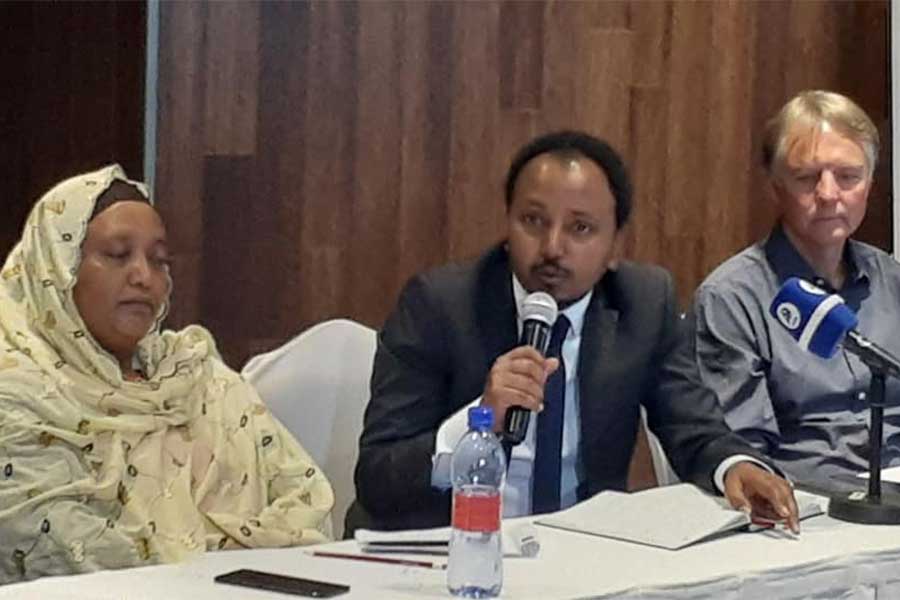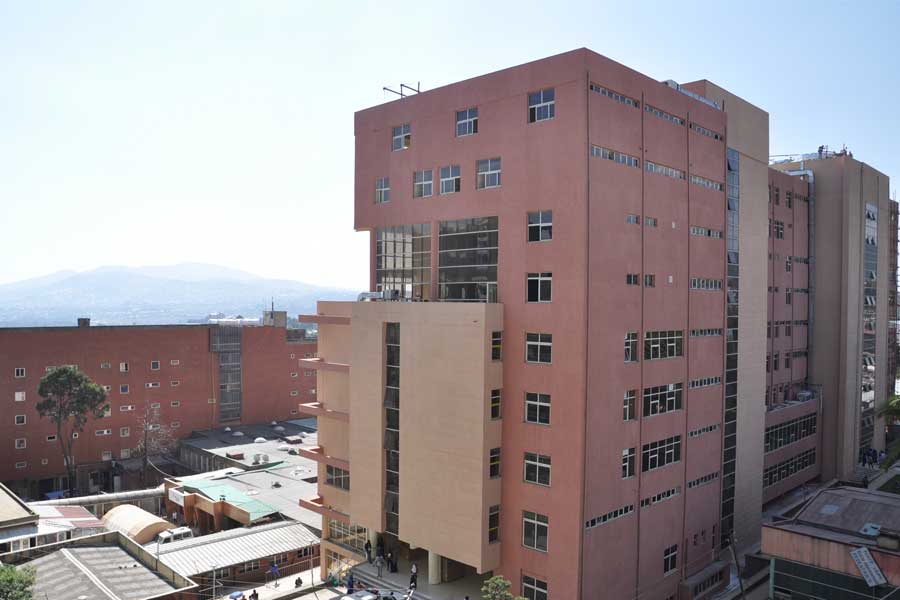
It is a windy morning, and the sun is rising over Lake Hawassa, 272Km away from the capital. The birds are chattering. Fishermen are floating on a wooden boat over the coffee-coloured river. Meanwhile, the guests of Haile Resort Hawassa seem to be more preoccupied with breakfast in the hotel's spacious dining hall than the picturesque scenes outside.
For an outsider, who had seen the hotel's empty seats soon after the emergence of the COVID-19 pandemic, the busy dining room is nothing short of a miracle. But for the management of the hotel, who have attempted every possible solution to endure the impacts of the pandemic, it is just the kind of ordinary day they were hoping for.
"Everything is almost back to normal," says Firesew Mekuria, a marketing manager at the Resort.
Haile Resort Hawassa, part of the chain of hotels under the ownership of Haile Gebreselassie, was among those hardest hit by the economic slowdown that ensued in the wake of the pandemic. Resting on 52,000sqm of land, the Resort employs over 300 people and had to close off amenities and services like meeting halls and ballrooms as the number of guests visiting dropped to virtually zero in early 2020.
In an effort to attract patrons, the Resort had even cut rates for its 126 rooms by as much as half, charging less than 50 dollars a night for a standard room, down from the usual 85 dollars.
Now, the establishment is on the road back to normalcy, with business picking up again. Domestic tourism has played a big part in the revival, according to Firesew. He relayed that occupancy rates are climbing back up, currently sitting near 60pc.
"Some tourists have started booking and tour operators are also bringing around their customers," he said.
The hospitality industry is beginning to see signs of recovery following over a year of stagnation brought about by the COVID-19 pandemic.
Occupancy rates that were lingering around 10pc have now gone up, signaling a slow return to pre-pandemic levels. However, tourism, a major source of income for hotels, continues to languish.
The Radisson Blu hotel in Kazanchis has managed to push occupancy rates up to 30pc, a significant jump from the two percent that was registered shortly after the pandemic reared its head in the country in early 2020.
The state of emergency, travel restrictions and reluctance from tourists all brought about by the advent of the pandemic had previously plunged occupancy rates to as low as two percent, and many in the industry were left struggling to cover payroll and other operational costs. The slowdown was costing an estimated 35 million dollars in losses every month.
However, lately, things have been looking up as the industry prepares for tourist season, which runs from September to April. Signs of recovery are emerging even against a backdrop of a crackdown against some hospitality establishments in the capital, leading to the closure of nine prominent hotels accused of funding the Tigray People Liberation Front (TPLF) and allegedly involved in activities that disparage the Ethiopian National Defense Force (ENDF), among other things.
Rori International Hotel, a five-year-old establishment also located in Hawassa, is among hotels enjoying recovery. The Hotel had been closed for over two months in mid-2020 and managed to get by hosting medical professionals and adjusting the salaries of its 200 employees. By September last year, occupancy rates had dropped to 10pc of its 100 rooms.
"The occupancy rate is much better now," said Zelalem Getenet, general manager, adding that the rate currently sits near 50pc.
The Hotel's management is not relying on leisure tourism, which they believe still has a long way to go on the road to recovery. Instead, they are banking on meetings and conferences to pick back up while also attempting to boost the establishment's capacity to host conferences.
Leisure tourism used to account for over 90pc of the country's tourism proceeds during peak season. Though it was hoped to revive after the discovery of vaccines for COVID-19, the emergence of another wave of the pandemic has prolonged the path to recovery. Industry players are now shifting their attention to conference tourism.
The management of Radisson Blu Addis Abeba, a four-star hotel that has been active for almost a decade, is also applying a similar strategy.
In a bid to acquire new customers and boost their occupancy rate, they have introduced discount rates and cut the prices of rooms by close to 40pc. The management hopes this will attract guests coming to the capital to attend conferences and those working for international organisations. This has also pushed their occupancy rate to 30pc, a jump from two percent that was registered shortly after the first COVID-19 case was reported in Ethiopia during March 2020.
"Our hotel was almost closed after the pandemic but it is now improving thanks to the recovery of conference tourism," said Elleni Surafel, director of sales and marketing at the Radisson Blu.
Haile Resort Hawassa, part of the chain of hotels under the ownership of Haile Gebreselassie, rests on 52,000sqm of land in the lakeside city 272Km south of the capital. Featuring 126 rooms, the resort employs over 300 people.
Business travellers account for over 90pc of tourism in Addis Abeba, according to Biniam Bisrat, CEO of Jupiter Hotel and chairperson of the Addis Abeba Hotel Owners' Association. He added that the average occupancy rate in the capital was around 67pc in 2019.
Though the hotels are performing better and registering a higher occupancy, industry players say the road to recovery is still a long way.
Kumneger Teketel is a managing director of Ozzie Hospitality & Management Consultancy. He has provided advisory services to 21 international franchises working in Ethiopia, including Radisson Blu, Mövenpick Hotels & Resorts, Golden Tulip Adama, Bon Hotel Addis Abeba and Royal Tulip.
The manager argues that the rise in occupancy rates does not necessarily imply that hotels are recovering.
"If the occupancy rate has increased, then rating must increase too," said Kumneger, who estimates the industry will need at least three years to fully recuperate. He cites that a lack of effective response strategies is behind the slow recovery, suggesting that hotels enhance their services through marketing schemes and introducing package offerings.
In addition to the consultant's critiques, it seems that hotels will remain disadvantaged by the stagnant tourism industry, which is far from reaching the pre-pandemic heights and might even be subject to further decline in the coming months.
Over the past decade, the tourism industry had shown encouraging growth. In 2019, tourist arrivals to Ethiopia registered at 812,000, a big leap from 136,000 in 2000, showing an annual growth rate of a little over 10pc.
In 2020, after the COVID-19 pandemic hit, arrivals to Ethiopia dropped by a staggering 69pc, according to a study conducted by the UNCTAD.
As if a global pandemic were not enough, the country has been going through a full-blown conflict. It goes without saying that the hospitality and tourism industries have taken a drastic hit from the civil war raging in Tigray Regional State and surrounding areas. This is a major setback for hotels and service establishments located in the northern regions of Ethiopia, which is known for prominent tourist attractions, such as those in Axum, Lalibela, and Lake Tana.
For these prime attractions, the uncertainty brought on by the war will translate into a disappointing tourist season.
Nova Hotel, Bahir Dar, is an example of a business being affected by the ongoing conflict. The Hotel had managed to drag its occupancy rates up to as high as 70pc after a period of inactivity last year, but the outbreak of the conflict has undone all the progress.
Less than 10pc of rooms are occupied following the resumption of the war, according to Wondwossen Fentie, a manager at Nova Hotel.
Government officials, who have facilitated over six billion Birr to help industry players survive in the aftermath of the pandemic, are expecting a good tourist season ahead.
Tourism Ethiopia is working on digital marketing strategies to carry the industry through the coming months.
"We've developed a virtual guide for potential tourists," said Sileshi Girma, its director. "And we're working on facilitating tourist destinations with suitable accommodations and infrastructure."
Nonetheless, the solution put forward by the office does not seem to be satisfactory for businesses severely impacted by the pandemic. This includes Click Tour & Travel Agency.
"Most tour operators have closed their offices and turned to the car rental business," said Mulugeta Alemnew, an owner of the Agency, which used to provide a range of tour packages to around 100 tourists during the busy season prior to the pandemic. That figure is a pipe dream to him and his peers now and there is no saying when that will change.
PUBLISHED ON
Sep 04,2021 [ VOL
22 , NO
1114]

Commentaries | Jan 07,2023

Commentaries | Jun 15,2024

Fortune News | Feb 22,2020

Radar | Dec 28,2019

Commentaries | May 31,2025

Fortune News | Nov 02,2019

Verbatim | May 18,2024

Viewpoints | Sep 06,2020

Fortune News | Jul 10,2020

My Opinion | Mar 12,2022

Dec 22 , 2024 . By TIZITA SHEWAFERAW
Charged with transforming colossal state-owned enterprises into modern and competitiv...

Aug 18 , 2024 . By AKSAH ITALO
Although predictable Yonas Zerihun's job in the ride-hailing service is not immune to...

Jul 28 , 2024 . By TIZITA SHEWAFERAW
Unhabitual, perhaps too many, Samuel Gebreyohannes, 38, used to occasionally enjoy a couple of beers at breakfast. However, he recently swit...

Jul 13 , 2024 . By AKSAH ITALO
Investors who rely on tractors, trucks, and field vehicles for commuting, transporting commodities, and f...

Jun 28 , 2025
Meseret Damtie, the assertive auditor general, has never been shy about naming names...

Jun 21 , 2025
A well-worn adage says, “Budget is not destiny, but it is direction.” Examining t...

Jun 14 , 2025
Yet again, the Horn of Africa is bracing for trouble. A region already frayed by wars...

Jun 7 , 2025
Few promises shine brighter in Addis Abeba than the pledge of a roof for every family...